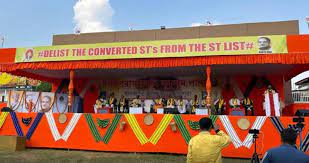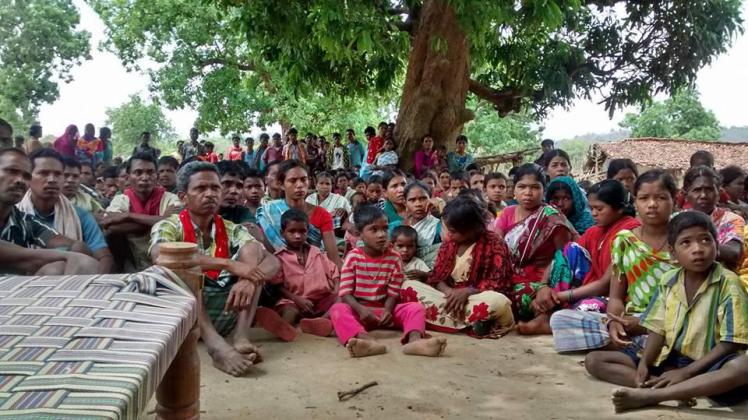Posted On March 31, 2024

A deep rift has arisen among STs. They are being divided into two camps in the name of tradition, culture, religion and heritage.
Tarique Anwar
New Delhi: Delisting, which aims to strip converted tribals of their Scheduled Tribe status, is creating a rift between tribal communities. The religious identity of being Hindu or Christian is dominating their collective identity of tribals, which is seemingly causing religious polarisation among them.
“It’s a conspiracy to divide us. If Christians and Sarna tribals are separated, we will become a minority. They try to label us as Sarna Sanatan. We are neither Hindus, nor Christians, but tribals. We are nature worshippers,” said Lukhi Murmu, a resident of Jarkhand’s Pakur district.
However, Narayan from a village in Gumla strongly disagrees with Murmu’s statement. “Those who converted to other religions no longer belong to our community. They do not respect our culture, customs and traditions,” he said.
Jharkhand, Chhattisgarh, Odisha, etc. have a strong tribal population, but nowadays there is a division between them of “local” and “outsider”. They are pitted against each other, and the issue of delisting is further widening their differences.
In the everyday life of tribal areas, the issue of delisting is linked to their culture, social identity and their economic-political rights.
According to the provisions of the Constitution, there is a separate list for Scheduled Castes (SC) and Scheduled Tribes (ST) in India. Article 341 (deals with SCs) and Article 342 (deals with STs) lists various tribes and castes. There is a selection criteria for each group.
They have been classified and listed in different states on the basis of their cultural heritage, traditions, lifestyle, customs and practices.
The reservation quota for ST stands 7.5 percent. According to the Fifth Schedule of the Constitution, some tribal-dominated areas have been given special status (Scheduled Areas), and under the Sixth Schedule, the tribal dominated states of the north-east have been given special status and rights. In these states, electoral seats are reserved for people of ST community.
In recent years, there has been a demand among those tribal communities that those who converted to Christianity or Islam should be excluded from the ST list. Hindu supremacist Rashtriya Swayamsevak Sangh (RSS)-backed Vanvasi Kalyan Ashram and Navagati Suraksha Manch have been strongly advocating delisting.
Maintaining independent existence of tribals and preserving their culture, religion, language and customs has been a long standing issue. These communities have been given special rights in the Constitution of India.
But cultural and religious diversity within the tribal communities living in different parts of the country has given rise to different interpretations. The community identifies itself as nature worshippers because of its dependence on forests. Therefore, they are called followers of the Adi Dharma. Some of them followed their religion for centuries.
Every tribal community from the north-east to the far south has its own customs and methods of worship. For example, in Jharkhand, tribals talk about Sarna religion. Many tribal communities considered themselves Hindu and assimilated Hindu traditions. Because of this, Hindu nationalist organizations consider them a Hindu.
Christian organizations have been active in Chhattisgarh and Jharkhand for decades. A large number of tribals here have been following Christianity for generations. Religious conversion has been a subject of controversy in India, and Hindu nationalist organizations in particular have been opposing it.
For the first time in 1967, the issue of delisting was raised by the then Congress leader Karthik Oraon. The issue was debated in Parliament too, but since then it has been on the back burner. An organisation called the Janjati Suraksha Manch, which was established in 2006 under the Vanvasi Kalyan Ashram, has renewed the demand.
Reservation at the Core of Delisting Debate?
People advocating delisting consider tribals as Hindus. But the opponents argue that the tribals have their own religion and customs, and they are free to follow any religion or method of worship of their choice. Therefore, if they exercise their freedom, it should not affect their right to reservation.
The second argument of the opponents of delisting is that reservation is given on the basis of a caste or community. It means it is by birth. How can it be denied on the basis of religion? The constitution does not have any provision of reservation based on religion.
It is true that the demand for delisting is inspired by religious conversion. It also has an economic aspect.
Tribal Christians are well-off far if compared to others. Those demanding delisting argue, “‘They’ get the benefit of reservation, not ‘us’.”
Though the Christian tribals acknowledge inequalities (social, economical and educational), they hold lack of education and awareness accountable for it. To get reservation, one must be educated and several generations of Christian tribals have received education from missionary institutions. Although these educational institutions are for everyone, their argument is, “Why are they troubled with our reservation rights?”
The tribals, who have lagged behind in education and employment, feel that the solution to their problems is reservation; and according to them, Christian tribals should be the first to be deprived of the benefits of reservation. And it can be done through delisting. This is how the issue is creating a divide within the tribal community.
‘If Conversion Ends SC Quota, Why Not ST’s?’
The advocates of the delisting argue that the tribals who embrace Christianity or Islam are getting double benefit.
Rameshwar Ram Bhagat, national general secretary of the RSS-affiliated Vanvasi Kalyan Ashram, said, “Hindu tribals are not getting even 10 percent benefit. But the converts are taking double benefit. They are getting benefits from both ST and religious minorities.”
Leaders of Christian tribals deny these allegations. The church located in the Kunkuri area of ??Jashpur is considered to be one of the largest churches in Asia. Most of the population here is Christian. Here, Dr Phoolchand Kujur runs a big hospital, which was established in 1956.
He said there is no separate government scheme or reservation for minorities. “Everyone takes advantage of Christian missionaries-run educational institutions and health facilities. There is no separate scheme for Christians or Muslims. The argument of double benefit is aimed at creating confusions only. No one is getting double benefits,” he added.
Reservation is not given in India on the basis of religion, and according to him, those who advocate delisting are actually demanding an amendment in the Constitution.
Their argument is that when SCs do not get reservation after conversion, then why is it not the same for tribals?
“Dr Ambedkar had made a provision in Article 341 of the Constitution. If anyone accepts any foreign-born religion other than Hinduism, Jainism, Buddhism etc., then he or she will have to give up SC reservation. This has been in force since 1956. This is exactly our demand,” said Inder Bhagat, regional coordinator of the Tribal Suraksha Manch.
He further said as soon as a tribal embraces another religion, he loses his traditions, customs and identity, which give him the right to reservation. And someone willingly loses his identity, then why should he get reservation, which is purely based on identity?
“Our demand is that Article 342 for STs should be amended on the basis of Article 341,” he added.
But Dr Kujur said, “This list has been made on the basis of tribe rather than religion. The law of the land gives people the liberty to adopt and practice any religion of their choice. People associated with the Tribal Suraksha Manch cite SC reservation, but they knowingly hide the fact that it is because SCs are part of Hindu religion. It does not apply to STs because the Adivasis are not Hindus.”
In Chhattisgarh and Jharkhand, on one hand, the Janjati Suraksha Manch is spearheading a movement for delisting, while on the other, the Christian Tribal Federation has decided to take to the streets against it.
Opponents say that if this is implemented, the entire tribal community will come under its influence. The concessions given under the Fifth Schedule will be in danger; and if the total tribal population decreases, the community will become de-scheduled (de-notified).
Dr CD Bakhala, spokesperson of the Christian Tribal Federation, said, “We have rights on water, forest and land. If delisting happens, we will be thrown out of our own forests and our existence will end. That is why we are protesting. This will not only affect Christians, but all the entire tribal community.”
“Under Article 330, we get representation in the Lok Sabha and under Article 332 in the Legislative Assembly. But if our state becomes a D schedule, everything will be taken away. We will neither be able to become village head or sarpanch nor MLA or MP,” he further added.
The ‘Local’-’Outsider’ Debate
Chhattisgarh’s Jashpur and its surrounding regions have witnessed a good number of conversions in the past few decades. According to an estimate, 22 percent of the tribal population here have converted to Christianity. And this has fuelled the narrative ‘insiders’ and ‘outsiders’.
The division has increased tension in tribal villages. And the rift has widened so much that people who have lived together in the forests for centuries now talk about separation.
Most of the people in Jashpur’s Sogda village follow Hindu customs. “We are nature worshipers and also worship idols. Those who believe in Christianity do not pray like we do. So, how can we live together? They have been lured into foreign religions and they became Christians. They are now different from us,” said a villager, Manejar Ram.
The area has a mixed population. Tribals have been living in the forests for many generations, and there has been no rift between them based on their religious affiliations. But they begin feeling unease when the issue of delisting is raised.
Munna Tapo denies that the tribals who convert abandon their tribal culture and traditions. “We follow the customs and traditions of the tribal community from birth till death. We go to church only to seek blessings. I challenge those who accuse us of abandoning traditions. They tell us which traditions we don’t follow,” said the resident of Ambikapur.
Anant Prakash asks a few direct questions: “If we are removed from the ST category, in which list will we be accommodated? In which category? What will be our status?”
Polarisation and its Impact on Upcoming Elections
The delisting issue is purely political and has a direct impact on electoral politics. Movements and protests are going on in Jharkhand, Chhattisgarh, Madhya Pradesh and even in the north-east states where a significant population is Christian. Similar protests are taking place in places like Nashik and Nandurbar in north Maharashtra.
The number of tribes adopting Christianity is high in north-eastern states like Arunachal Pradesh, Mizoram, Meghalaya and Nagaland. That is why the issue of delisting is prominent in these states, and there is more polarisation among the tribal communities.
Its impact is visible on the elections. In the last two-three years, there have been many conflicts in areas like Bastar. Many reports of violence have come to light. This will have a definite impact on the elections. And this issue will also have an impact in Odisha, Madhya Pradesh and Jharkhand.
There has been division in votes. In the recent election results of Chhattisgarh, a significant impact of issues like delisting, conversion and homecoming was seen.
The BJP is trying its best to capitalise on the rift. Therefore, it has nominated Janjati Suraksha Manch Convenor Bhojraj Nag as its candidate for the Lok Sabha elections from Kanker in Bastar.
Congress’ official stand in this regard has not been declared yet, but its leaders say that the BJP is raising the issue to divide and polarise people for electoral gains.
If politics is set aside, a deep rift has arisen among the tribals. In the name of tradition, culture, religion and heritage, they are being divided into two camps.
Courtesy : The Mooknayak

Leave a Reply